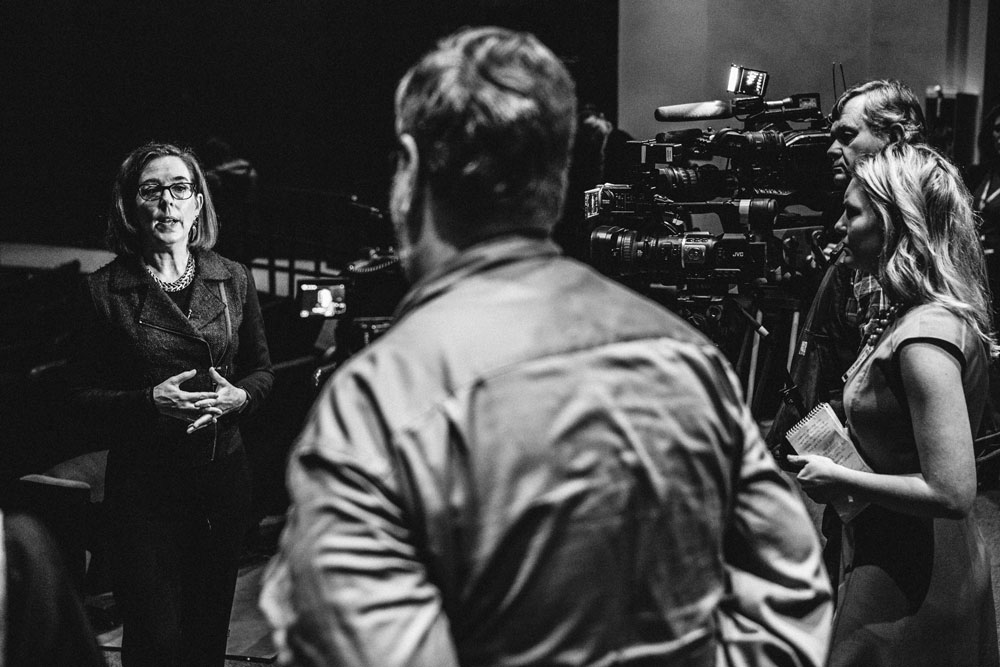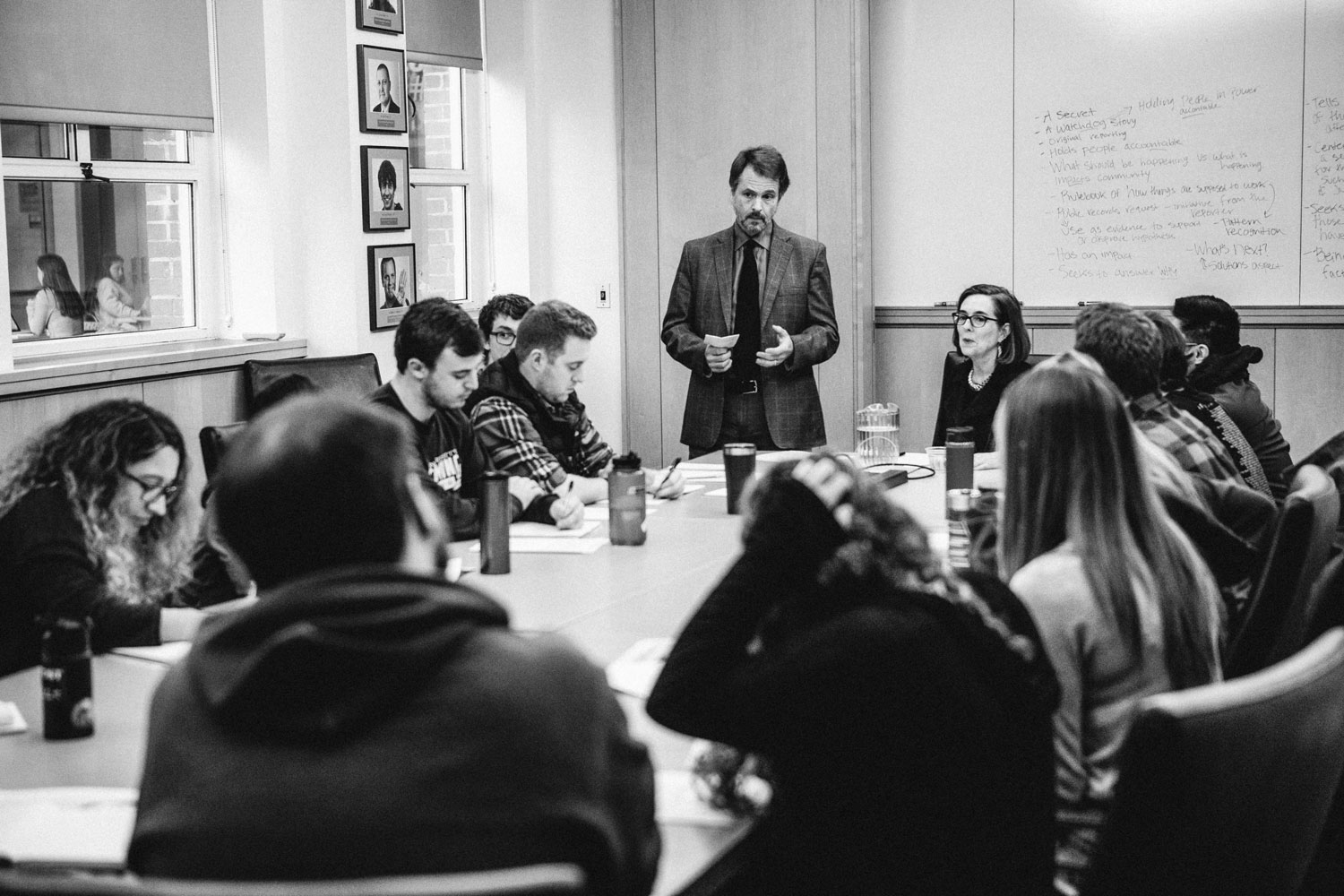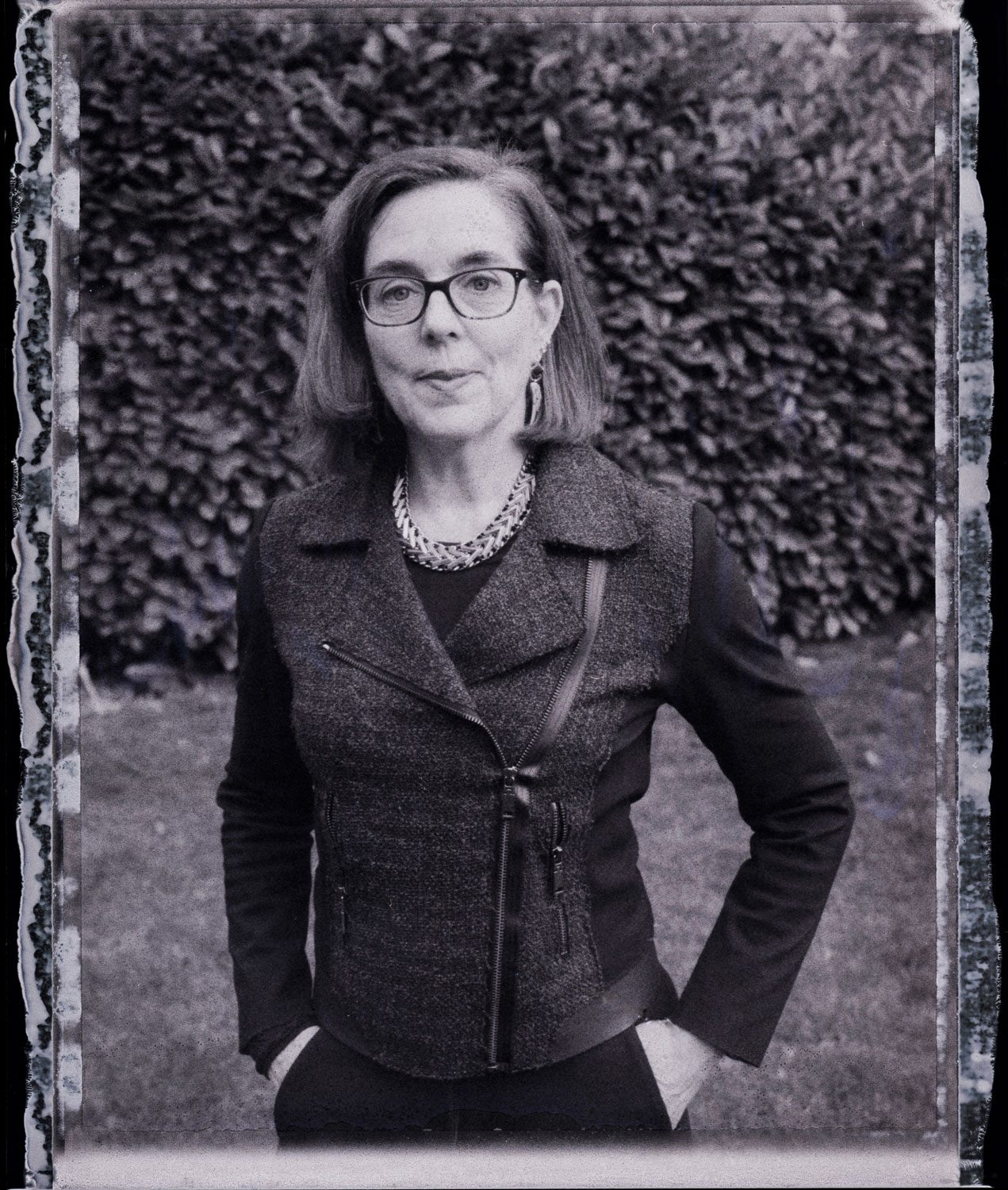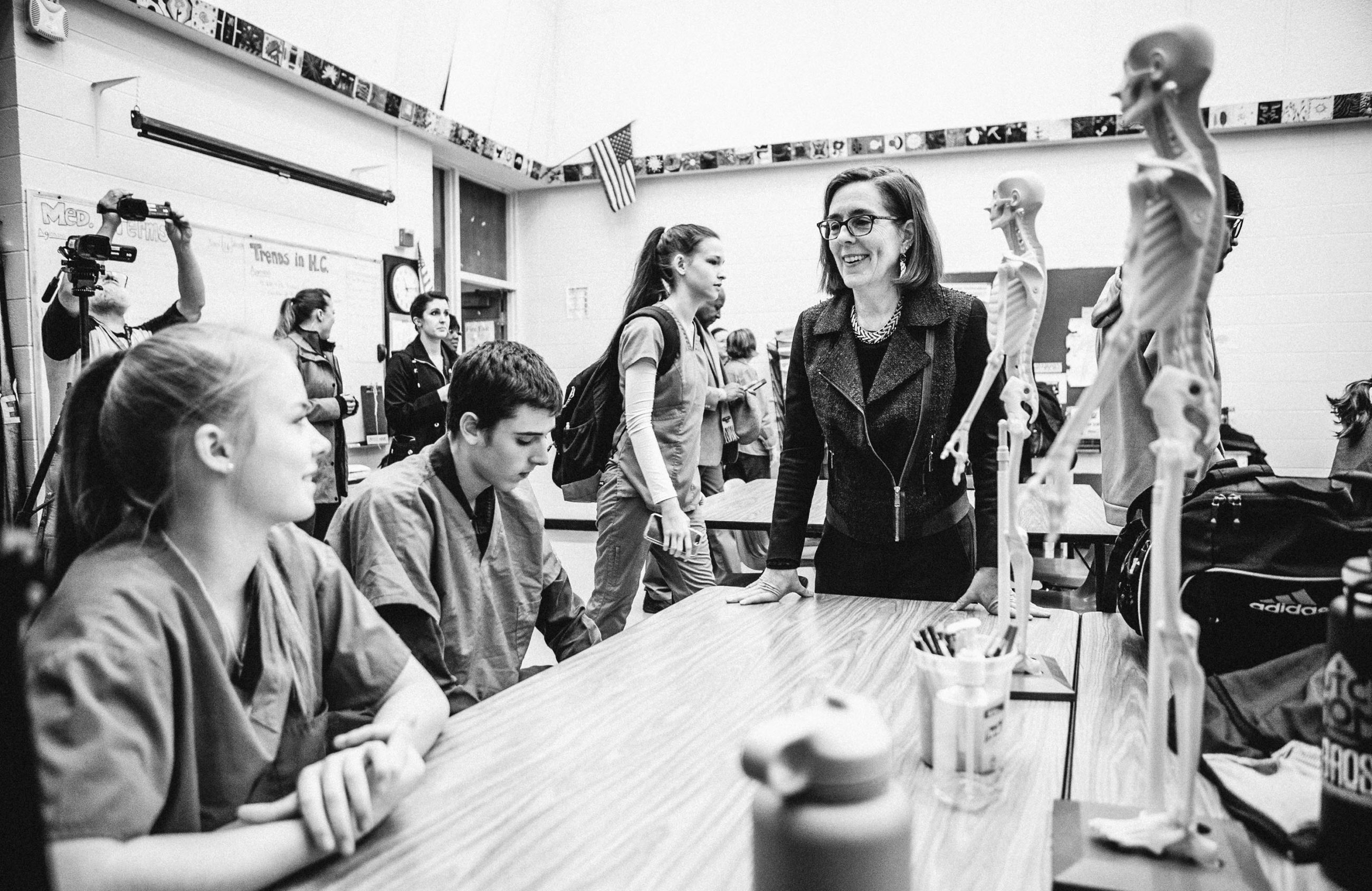On a Tuesday morning, Jan. 16, students, teachers and a few state legislators mingled in Eugene’s Winston Churchill High School auditorium. A couple of cameras lined the front rows, and soon everyone began looking toward the auditorium door.
Oregon Gov. Kate Brown walked down the aisle stopping to shake hands and say hello to the crowd. The overhead lights faded as the Churchill High School band — seated on stage — played the national anthem.
As Eugene Weekly’s legislative reporter, I was there to cover Brown for the day and get a sense of the governor and what she was thinking about heading into election season. Brown was visiting Churchill High as part of her State of the State tour. Later she would visit the University of Oregon and we would sit down for a one-on-one interview. Issues that Brown would address throughout the day include immigration, homelessness, LGBTQ equality, the rise of white nationalism and discrimination against people of color and public records laws.
“Good morning, everyone,” Brown said when she took the Churchill stage. “I was here a year ago.” She asked to see the number of hands of students in technical education programs, and began telling the story of her paternal grandmother.
“My grams was a nurse,” Brown said, explaining that her grandfather was a doctor who struggled with drug addiction. “But my grams worked really hard. She taught the boys that the key to a better life is education, education, education.”
Her dad was one of four boys, she said, and he, along with two of his brothers, became doctors. “Because my dad worked hard,” Brown continued, “I never worried about food or the heat being shut off.” Her parents taught her that she could do anything. “Eighty-five years ago, my grams put us on a path.”
Though she grew up in an economically stable household in Minnesota, Brown said she understands that thousands of Oregonians are struggling. “It was once thought that if you played by the rules, you could get ahead,” she said. It’s critical that every student graduates from high school, she added, emphasizing that Oregon has one of the lowest graduation rates in the country.
“One in four students doesn’t graduate,” she told the crowd.
Enlarge

Photo by Todd Cooper
Brown wants the graduation rate to be at 90 percent by 2025. “Will you help me with that goal?” she asked enthusiastically of the assembled students.
Brown gave a nod to state Rep. Julie Fahey and Sen. James Manning for helping secure Career and Technical Education programs in public schools. “Do you enjoy your hands-on learning opportunities?” Brown asked. The high school students cheered and clapped. CTE programs connect students directly to the workforce and provide training for jobs in the IT and natural resources fields, Brown explained.
“Now I want to hear from you about what you want and what you need to succeed,” she said as she stepped down from the stage and into the aisles.
Brown was impassioned when telling her family story. I’ve reported on Brown when she has visited schools and appeared at events in Eugene. She takes time to meet with the press. She stops and shakes hands with people who want to speak with her. She sits in classes with students. She listens when people ask questions, even when her staff is reminding her that her next scheduled event is approaching.
With Brown’s appearance structured like a town hall meeting, the Churchill High students came prepared and began asking tough questions about the cost of college, the environment and homelessness.
One student asked Brown about her plan for homeless families. “I was homeless for three years,” the student said.
Brown thanked the student for sharing a personal story. “We have 22,000 students who don’t have a place to call home,” she said, adding that more can be done to provide families with rental assistance and affordable housing. “Every child should have a warm, dry place to call home.”
After the assembly, a circle of students congregated around Brown, waiting to speak to her. The governor listened as some asked questions about their safety as LGBTQ students.
“I’m the only elected bisexual governor in the country,” Brown said, reiterating the importance that LGBTQ students feel safe.
Another student approached Brown and said, “I’m a queer young woman who wants to run for office.” The student told Brown that she is an inspiration to her, and applauded her for all that she is doing as governor.
Kate Brown is the 38th governor of Oregon and the second woman to hold the state’s highest elected office. As the former secretary of state, Brown was appointed to the office after former Gov. John Kitzhaber resigned in 2015. She ran for a two-year term in 2016 and is running for a full term in November.
Rep. Knute Buehler, a Republican representing Bend, is running against Brown in the 2018 gubernatorial race.
Brown said her multi-appointment day is not atypical. She loves meeting with people, especially students and small business owners. She received an early endorsement from the League of Conservation Voters, a non-partisan group that tracks environmental legislation and actions. They named Brown their 2017 “Environmental Champion of the Year” recipient and endorsed her last year for the 2018 election.
After lunch, I caught up with Brown and her communications staff at the University of Oregon’s School of Journalism and Communications. Brown attended professor Brent Walth’s investigative reporting class.
Walth, a Pulitzer Prize-winning journalist, was recently appointed to the Oregon Sunshine Committee, a public records review board. He outlined Brown’s 25-year career, noting that the governor has made the biggest improvements in transparency and public records law since 1973.
Enlarge

Photo by Todd Cooper
Brown was seated at the head of the table in a class of more than a dozen students. She started by telling the class that she went to law school because she wanted tools to achieve justice.
But just after finishing law school, she said she experienced “a wakeup call.” Brown said she discovered she “was being paid less than a male coworker. I was in a relationship with a woman at the time and scared I’d lose my job.”
She became an advocate for Planned Parenthood in the 1991 legislative session — Brown called the organization a radical women’s rights group and then joked that the class should have corrected her knowing that Planned Parenthood is not a radical activist group.
The first time she ran for the state Legislature in 1992, Brown was outspent two to one.
Brown won that election by seven votes, and she said people still approach her today saying they were one of that seven. “For me, that was a life lesson — that every single vote is a voice,” she said.
Brown said she’s worked on issues including child support, women’s health and domestic violence issues, as well as making sure that LGBTQ issues were being heard.
The most important bill that she has signed into law, she said, is the automatic voter registration, known as the Oregon Motor Voter law, which uses rosters from the Department of Motor Vehicles when Oregon residents renew or apply for a driver’s license.
Brown told the class that she’s working to rebuild public trust and continues to work on public records and transparency.
In January 2017, Brown appointed Ginger McCall as Oregon’s first public records advocate. The position will provide dispute resolution for public records requestors and state agencies and evaluate practices, procedures, exemptions and fees related to public records.
Brown took multiple questions about public records from the journalism students. One expressed concern over adding another layer to the public records process, noting that the state already struggles with the current process.
“I have to disagree respectfully,” the governor replied. “My goal was to approve efficiency speed. I know it feels like it adds a layer, but it ensures public records get out.”
For Brown’s final meeting of the day, she sat down with a Springfield High School senior Emilee Daley and me in a small conference room in the UO journalism school. We were each given 15 minutes for questions.
Daley asked Brown about her most difficult experience as governor. Brown said it was “painful to meet with families post UCC and offer them comfort. It was really hard.” Brown said the mass shooting at Umpqua Community College affected the Oregon community as a whole.
“What would you say to people turned off by politics?” Daley asked.
“I love visiting businesses large and small and not talking directly politics,” Brown said, adding that she enjoys talking to people about their kids and families.
I asked Brown if it was OK to record our conversation and she joked, “Yes, it’s OK if we’re recording too?”
Enlarge

Photo by Todd Cooper
Since announcing she will seek reelection, Brown said, she’s heard three big issues concerning Oregon voters. The number one issue, she said, is “health care and access to health care. What is different now in the last couple of years is that, at least in Oregon, people expect that our vulnerable and that our struggling families have access to health care.”
Another major issue concerning Oregonians is education. “There’s folks who want to make sure our high school graduation rate improves,” Brown said. “I didn’t ever get to the two other pieces, creating what I call a seamless system of education from cradle to career. We need comprehensive early childhood education; we need a system of quality day care in this state. We need access to early childhood services, home visitation.”
Brown continued: “The third piece in education is educator advancement — making sure that educators have the professional development and the coaching and the mentoring they need to be successful in the classroom. The world of education has changed, and we want to make sure our educators reflect the diversity of our communities around the state.”
I asked Brown whether she supports a universal health care or a single-payer system of health care.
“I certainly support everyone having access to health care, so I would say ‘yes’ to universal. What I would say is this: In Oregon we have now achieved 95 percent coverage of adults, and moving onto 100 percent coverage of children,” Brown said. “It’s been a very good system. It’s cost effective, and I’d like to continue to sustain this program until I see something better.”
I asked Brown to provide specifics about the student who had once been homeless and asked what she was doing for homeless families.
“Look, I don’t know what it would be like to try and study and read and do your homework at night if you didn’t have a warm dry place,” she said. “I don’t know how you get dinner, how you figure out where you’re going to get a bag lunch to take to school or the funding to, you know, I assume a lot of schools have free lunch.”
She continued: “But it’s a huge challenge for these students just to survive. I think for us we’re focused on how do we work on building more affordable housing, investing, partnering with the private sector, giving local jurisdictions more tools in ways that will encourage the development of more affordable housing and really focus on our children making sure that we get our kids off the streets and into warm, dry safe places.”
Brown said more preventative measures like rental assistance and bonding affordable housing are needed to keep people from becoming homeless.
In the past year, Eugene has seen an increase in hate incidents and a rise in the white nationalist movement. I asked Brown what she would say to people in Oregon to make sure that they feel safe.
Brown said reporting incidents of hate crime is important. “And one of the most recent examples we had of this was the TriMet light rail incident, where there was a fellow harassing and making horrible comments to two young Muslim women,” she said of the May 26 murders in Portland.
“As you recall, the three men that stood up and they ended up fighting — two of them lost their lives over that — but I think it’s really important in our classrooms and our day to day lives when we hear people, children, adults, making derogatory comments, discriminatory comments, being hateful, that we just say this is not okay.”
Our interview wrapped up with a discussion about Trump’s “shithole countries” comment.
“First of all, it is absolutely appalling that he made those comments,” Brown said. “I think that Oregon and the United States are better served when we are welcoming to our immigrant and our refugee communities. Just to give you a small snapshot, I think we have about 11,000 or 12,000 Dreamers in Oregon.”
Brown added that Dreamers are important to the community, saying they’ve “contributed several hundred million dollars to the economy. I met this young Dreamer who is now a senior in a dental program, and he’s going to graduate this spring and become a dentist. He has no clue what is going to happen to him.”
“But we need more bilingual dentists,” Brown said as she tapped the table. “Right?”
Before leaving for Bend that afternoon, Brown talked about not wanting people in our communities to live in fear.
“For me it’s about building a beloved community and literally figuring out how we incorporate all of Dr. Martin Luther King’s dream and a culture of nonviolence,” she said. “It’s not going to take just [the] governor and Legislature; it’s going to take community organizations; it’s going to take individuals to make that change.”
Brown will have a chance to continue to work on key issues in Oregon as she runs to keep her position as governor.
Oregon’s gubernatorial election will take place on Tuesday, Nov. 6, 2018. Seven candidates have filed to run as Republicans, including Buehler. Kate Brown is the only Democrat who has filed to run.
Help keep truly independent
local news alive!
As the year wraps up, we’re reminded — again — that independent local news doesn’t just magically appear. It exists because this community insists on having a watchdog, a megaphone and occasionally a thorn in someone’s side.
Over the past two years, you helped us regroup and get back to doing what we do best: reporting with heart, backbone, and zero corporate nonsense.
If you want to keep Eugene Weekly free and fearless… this is the moment.
